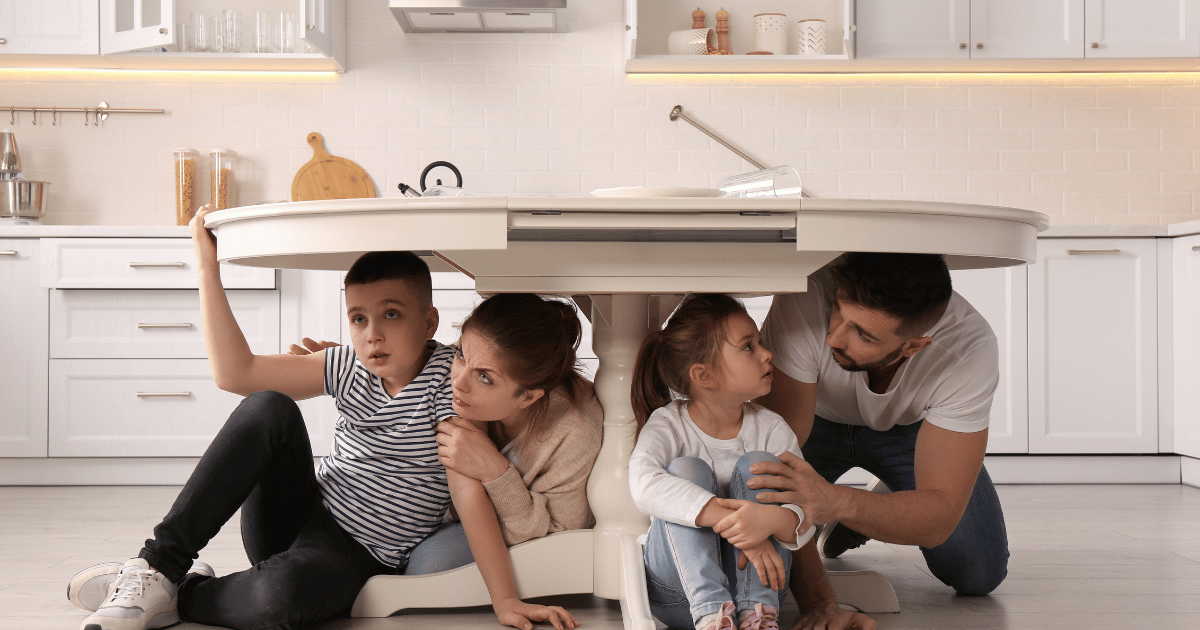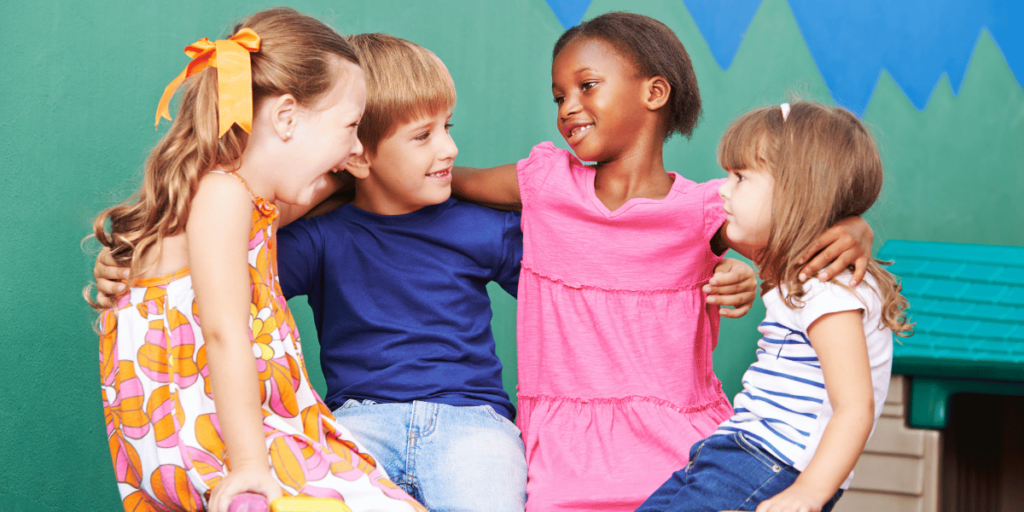The Sky Is Not Falling—3 Ways to Help Our Kids Find Calm in Chaos
We’re a full year from the next presidential election, but does anyone else feel like it’s already in full swing? I know. Too soon.
As a former public policy analyst who cares deeply about both policy issues and family relationships, I’m going to try to walk the fine line between the two today. In fact, while political races—and hot-button issues and divisive rhetoric heat up—I’m even going to risk being a little blunt: Parents, the sky is not falling. Yes, there are very real issues out there in the world. But a major study (that I’ll describe below) recently revealed the fact that our catastrophizing about those issues is actually hurting our kids.
We all know societal challenges are real. And some people are absolutely called to address them and fight for change. But it turns out: how we discuss, work, and engage for societal change is incredibly important for our kids’ mental health—and our own.
The research demonstrated that every time we jump to the worst conclusions about the current state of the country or its political leadership (no matter what side of the aisle we’re on), and we vent our views, we add to the stress our kids are carrying. We also increase our own risk of greater anxiety and depression.
I have spent hundreds of hours talking to tweens, teenagers, and young adults for books like For Parents Only and for my blog. Wherever you are in your parenting journey, these three action steps will help you equip your kids to maneuver this ever-changing world with greater confidence and hope. And they may just help you as well.
Action Step #1: Teach kids—and ourselves—not to catastrophize
The phrase “more is caught than taught” is truer than we’ve ever known. So, when we model a “sky is falling” behavior for our kids, we’re actually teaching them to behave that way.
Ouch.
Catastrophizing is essentially thinking and saying things like, “If XYZ happens, it is going to be a catastrophe!” And in our culture there is plenty to catastrophize about. Certain things may in fact be a catastrophe if they happen. But all too often, we mentally build up possibilities into certainties.
More important, even those of us who are people of faith too easily ignore the fact that God is still working in our world. He is still in charge. After all, the first-century church faced far greater challenges than any of us face in our culture, and yet those facing the most immediate persecution were given commands like “If possible, so far as it depends on you, live peaceably with all” (Romans 12:18) and “Do not be anxious about anything, but in every situation, by prayer and petition, with thanksgiving, present your requests to God.” (Philippians 4:6)
We are commanded to live in peace, not fear—even when there are indeed things to fear! As Jesus put it, “Peace I leave with you; my peace I give to you. Not as the world gives do I give to you. Let not your hearts be troubled, neither let them be afraid.” (John 14:27)
How do we do this?
First, before we can teach our kids not to catastrophize, we must gain perspective on our own thoughts. In a piece published earlier this year, Matthew Yglesias writes:
For a very wide range of problems, part of helping people get out of their trap is teaching them not to catastrophize. People who are paralyzed by anxiety or depression or who are lashing out with rage aren’t usually totally untethered from reality. They are worried or sad or angry about real things. But instead of changing the things they can change and seeking the grace to accept the things they can’t, they’re dwelling unproductively as problems fester.
As we steward our role as parents to impressionable children, we have to grapple with that profound question: are we changing the things we can and seeking the grace to accept the things we can’t? Being mad about politics or news headlines all the time is not helping our kids. And although not everyone who reads this blog is a person of faith, I believe those of us who are have a God-given responsibility to model peace in the storms of life to our children.
Thankfully, that sense of parental responsibility may help us continue a healthy habit we might otherwise lose when things get hard.
Action Step #2: Think parentally first, and politically second
In the last few presidential election cycles, it’s become more and more clear that the days of keeping our political persuasions to ourselves are gone. Still, parenting isn’t political. No matter how open we are about our political views, our job as parents first and foremost is to shepherd the hearts of our kids.
That said, I am now going to walk what I realize is a very fine line. Research shows that teenage children of politically liberal parents are more likely to deal with depression—perhaps because liberal parents are somewhat more likely to catastrophize (more on that below). A study released this year, “The politics of depression: Diverging trends in internalizing symptoms among US adolescents by political beliefs,” analyzed nationally representative data of more than 86,000 12th-grade students from 2005 to 2018. Researchers found that depressive scores were highest for female liberal adolescents. Overall, conservative adolescents reported lower average depressive affect, self-derogation, and loneliness, and higher self-esteem scores. Overall, depression ranked highest among liberal girls, then liberal boys, then conservative girls, then conservative boys.
This data accompanies other findings that, overall in America, teenage girls especially are experiencing alarmingly high levels of sadness, hopelessness, and depression, according to the CDC’s Youth Risk Behavior data. In fact, almost 60% of teen girls say they experience hopelessness or persistent sadness, up from 36% in 2011 (p.61). But now we know that there is another factor that appears to impact where a teenager might fall on that spectrum.
Now, this isn’t to make a pro-conservative or anti-liberal argument. (Those who know my professional background know that in my twenties I worked for Democrats on Capitol Hill.) But the data is stark—and other research appears to show why. It’s not because there’s something inherently damaging or healthy about the complexities of any particular ideology. But it could be that when adults verbally signal belief in impending catastrophes on massive issues like climate change (which tends to be discussed more in a liberal context), the listening brains of children and teenagers absorb these fears. They feel trapped with no way out (since that is the implication of catastrophizing), and become depressed and hopeless.
So as parents of every political persuasion, we need to ask ourselves: in what way are we doing that for the issues we care about? Our children could be absorbing our fears in exactly the same way.
Being honest with ourselves can help us be newly attuned to signs of hopelessness or depression in our adolescents. If we think parentally (how can we shepherd them through this) rather than politically (how might we vent about what we think is wrong), we may help them feel less trapped and fearful.
Action Step #3: Listen to your kids’ fears
In my research for For Parents Only, I discovered that when teenagers act out or “cop an attitude,” this is often an outward sign of their secret fears and insecurities. The data shows that in boys, feelings of powerlessness or insecurity come out as angry, sullen, or withdrawn behavior. Girls, meanwhile, mouth off with lippiness, sarcasm, or antagonistic talk.
If we see these signals, it is time to not only correct and redirect undesirable behavior, but to put our detective hats on and ask questions. And the first question is the hardest one, because it’s one we need to aim at ourselves: Are we doing anything to trigger insecurities in our kids? See Action Step #1. Rinse and repeat.
After that, curiosity goes a long way. Ask questions that draw your kids fears out. Validate their fears and contextualize them in a way that reminds them God is in control. This can help our kids (and us) remember that not only is the sky not falling, but we, in fact, serve a God who rides through the skies looking for those who need help! (Deuteronomy 33:26)
Then, whether it’s a political season or a tough personal or family season, you will have set a template not of catastrophizing but of contextualizing. Issue by issue and news cycle by news cycle, we can help our kids process the massive amount of information they are taking in with hope, peace, and the ultimate reassurance that God is in control.
And if you are interested in having Shaunti speak on kindness for your workplace, church, school or community group, please contact Nicole Owens at nowens@shaunti.com.
Please note: This post may contain affiliate links. As an Amazon Associate we earn a small amount from qualifying purchases through these affiliate links. This doesn’t cost you anything, and helps us continue bringing you great content!







